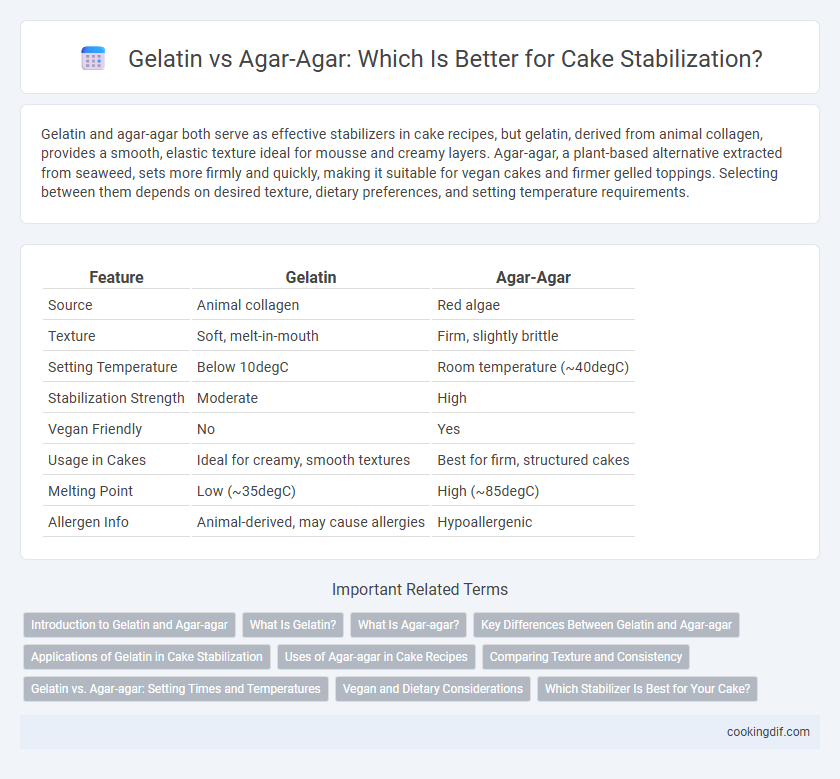Gelatin and agar-agar both serve as effective stabilizers in cake recipes, but gelatin, derived from animal collagen, provides a smooth, elastic texture ideal for mousse and creamy layers. Agar-agar, a plant-based alternative extracted from seaweed, sets more firmly and quickly, making it suitable for vegan cakes and firmer gelled toppings. Selecting between them depends on desired texture, dietary preferences, and setting temperature requirements.
Table of Comparison
| Feature | Gelatin | Agar-Agar |
|---|---|---|
| Source | Animal collagen | Red algae |
| Texture | Soft, melt-in-mouth | Firm, slightly brittle |
| Setting Temperature | Below 10degC | Room temperature (~40degC) |
| Stabilization Strength | Moderate | High |
| Vegan Friendly | No | Yes |
| Usage in Cakes | Ideal for creamy, smooth textures | Best for firm, structured cakes |
| Melting Point | Low (~35degC) | High (~85degC) |
| Allergen Info | Animal-derived, may cause allergies | Hypoallergenic |
Introduction to Gelatin and Agar-agar
Gelatin, a protein derived from animal collagen, is widely used in cake stabilization for its smooth texture and clarity when set. Agar-agar, a plant-based polysaccharide extracted from red seaweed, offers a vegan alternative that sets more firmly and withstands higher temperatures. Both stabilizers influence the moisture retention and structural integrity of cakes, with gelatin providing a tender finish and agar-agar delivering a more resilient gel.
What Is Gelatin?
Gelatin is a natural protein derived from collagen found in animal bones and skin, commonly used as a gelling agent in cake stabilization. It provides a smooth, clear, and elastic texture, making it ideal for mousses, cheesecakes, and layered desserts that require firm yet tender consistency. Unlike agar-agar, gelatin melts at body temperature, offering a more delicate mouthfeel and enhanced flavor release in baked goods.
What Is Agar-agar?
Agar-agar is a plant-based gelatin substitute derived from red algae, commonly used in cake stabilization for its strong gelling properties. Unlike animal-based gelatin, agar-agar sets quickly at room temperature and remains stable even in warm conditions, making it ideal for vegan and vegetarian desserts. Its ability to create a firm, jelly-like texture without refrigeration enhances the shelf life and presentation of cakes.
Key Differences Between Gelatin and Agar-agar
Gelatin, derived from animal collagen, melts at body temperature and provides a smooth, creamy texture ideal for mousse and custard-based cakes. Agar-agar, a plant-based seaweed extract, sets firmer and remains stable at higher temperatures, making it suitable for vegan desserts and gelatin molds requiring room temperature stability. Key differences include gelatin's animal origin, melt-in-the-mouth softness, versus agar-agar's vegan source, higher setting temperature, and firmer, less elastic texture.
Applications of Gelatin in Cake Stabilization
Gelatin plays a crucial role in cake stabilization by providing a smooth texture and enhancing structural integrity, especially in mousse cakes and layered desserts. Its ability to gel at low temperatures makes it ideal for preserving shape without compromising softness. Gelatin is widely favored for its natural origin and versatility in stabilizing creamy fillings and frostings.
Uses of Agar-agar in Cake Recipes
Agar-agar is widely used in cake recipes as a vegetarian gelatin substitute that provides strong gelling properties and a clear, firm texture. It stabilizes mousses, creams, and layered cakes by setting mixtures quickly and maintaining their shape without melting at room temperature. Its high fiber content and neutral flavor make agar-agar ideal for creating smooth, stable cake fillings and decorative elements.
Comparing Texture and Consistency
Gelatin creates a smooth, creamy texture with a flexible yet firm consistency ideal for traditional cakes and mousses. Agar-agar sets more firmly and gives a slightly brittle, jelly-like texture that holds shape well, making it suitable for vegan or vegetarian cakes. The choice between gelatin and agar-agar significantly influences the cake's mouthfeel and stability under various temperature conditions.
Gelatin vs. Agar-agar: Setting Times and Temperatures
Gelatin sets at a temperature range of 15-20degC and requires refrigeration for about 2-4 hours to achieve optimal stabilization in cakes. Agar-agar, derived from seaweed, sets faster at room temperature within 30-60 minutes and can withstand higher temperatures up to 85degC without melting, making it ideal for heat-stable cake fillings. The choice between gelatin and agar-agar depends on desired setting speed, temperature tolerance, and texture preferences in cake stabilization.
Vegan and Dietary Considerations
Gelatin, derived from animal collagen, is commonly used for cake stabilization but is unsuitable for vegans and individuals with dietary restrictions related to animal products. Agar-agar, a plant-based gelatin substitute extracted from seaweed, offers a vegan-friendly and allergen-free alternative that sets firmly at room temperature without refrigeration. When choosing between the two, agar-agar provides a sustainable, ethical solution while maintaining effective stabilization and texture in vegan cakes.
Which Stabilizer Is Best for Your Cake?
Gelatin and agar-agar are popular stabilizers for cakes, with gelatin derived from animal collagen providing a smooth, elastic texture and a clear, shiny finish. Agar-agar, a plant-based alternative extracted from seaweed, offers a firmer, more brittle gel suitable for vegan and vegetarian cakes while maintaining structure at higher temperatures. Choosing the best stabilizer depends on dietary preferences and desired texture, with gelatin favored for creamy desserts and agar-agar ideal for firm, stable cake layers and allergy-friendly options.
Gelatin vs Agar-agar for stabilization Infographic

 cookingdif.com
cookingdif.com